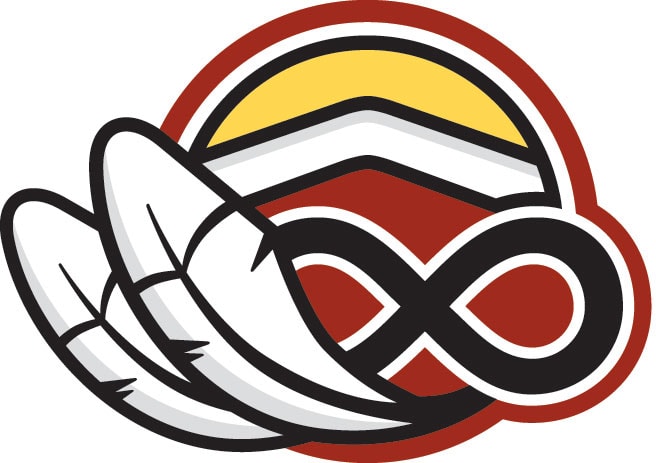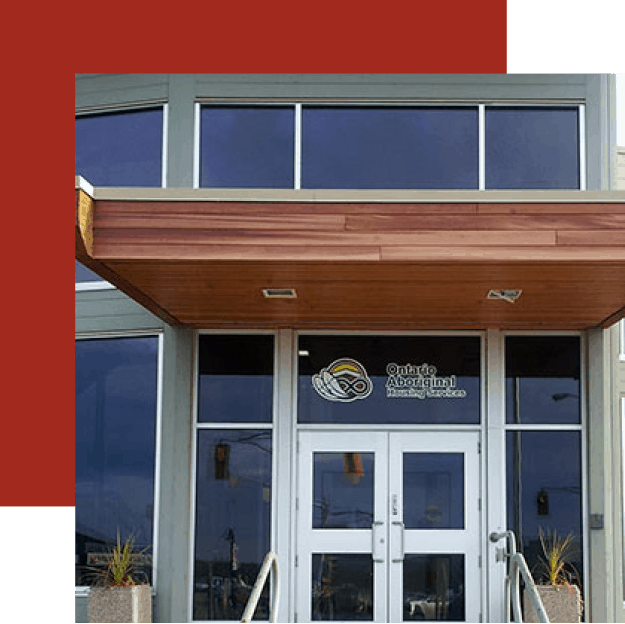
OAHS is Ontario Aboriginal Housing Services which is a non-profit housing provider with a focus on the Indigenous community.
Ontario Aboriginal Housing Services is a corporation with a mandate to provide safe and affordable housing to urban and rural First Nation, Inuit and Métis people living off-Reserve in Ontario. Our vision is to lead the design, development and delivery of a sustainable and culturally appropriate continuum of housing that promotes excellence in the community and organizational infrastructures.
Land Acknowledgement
Today, and everyday, we recognize and acknowledge that OAHS’s Sault Ste. Marie offices are located on this land known as Bawaating, the place of the rapids. This is the traditional territory of the of Anishinaabeg, specifically Batchewana First Nation, Garden River First Nation, the Sault Tribe of Chippewa Indians, Bay Mills Indian Community, and later, the Métis peoples. Bawaating has always been a very important gathering place for many other nations as well.
Land acknowledgments are not intended to be feel-good routine public gestures to placate Indigenous peoples. Neither are they meant to relegate Indigenous peoples to a mythic past while failing to acknowledge that they were dispossessed of said lands. Some argue that, even if unintentionally, such assertions tacitly affirm the putative right of non-Indigenous people to now claim title to the lands. A territorial or land acknowledgement is an important act of reconciliation that involves making factual statements that recognize, educate, remember, and honour the history of the lands we occupy and the first peoples whose traditional territory it has been for time immemorial and will be for eternity. It is a truth that recognizes the traditional territory of the Indigenous people who call the land home before, during and after arrival of the settlers, and to this day. With that truth comes a clear understanding of Indigenous peoples’ placement on these lands as an inherent right bestowed upon them by Gitchee Manidoo, the Great Spirit, with inherent and infinite responsibility for the lands, (and waters), to ensure sustainability for the wellbeing of the next seven generations of all peoples who inhabit the lands. Land acknowledgements should motivate you to be an active participant in, and advocate for, reconciliaction.
OAHS offices in Bawaating are located not far from the original site of the signing of the Robinson-Superior and Robinson-Huron Treaties in September 1850. These agreements provided, what was the Province of Canada at the time, access to the north shores of Lake Huron and Lake Superior for settlement and mineral extraction. In exchange, the Indigenous peoples gained formal recognition of hunting and fishing rights, an annuity, and a reservation specific for each signatory community. Interpretation of the Robinson treaties have legal and socioeconomic impacts on Indigenous and settler communities, and they established precedents for the Numbered Treaties that followed. It is also important to acknowledge that the Anishinaabe of the Bawaating area comprise one of the three Councils of the Three Fires Confederacy. And according to the Midewiwin scrolls, the Three Fires Confederacy dates as far back as 796 AD at Michilimackinac. Bawaating is the homelands of many Indigenous peoples. As descendants of Indigenous peoples and settlers, we extend our deepest respect to all the original, current, and future Indigenous inhabitants of not just Bawaating, but across Turtle Island.

Les Services de logement pour les Autochtones de l’Ontario (« Ontario Aboriginal Housing Services », ou « OAHS ») sont une société sans but lucratif qui fournit des logements à la communauté autochtone.
Le mandat des Services de logement pour les Autochtones de l’Ontario est de fournir des logements sûrs et abordables aux membres des Premières nations, aux Inuits et aux Métis vivant hors réserve en milieu urbain et rural en Ontario. Notre objectif est de prendre la tête de la conception, du développement et de la livraison d’un continuum de logements durables et adaptés au contexte culturel qui encouragent l’excellence dans les infrastructures communautaires et organisationnelles.

ᐅᐣᑌᕆᐅ ᐃᓂᓂᐧᐃ ᐧᐊᐢᑲᐃᑲᐣ ᐊᑐᐢᑫᐧᐃᓇ, ᐁᐧᑲᓂᒪ ᐊᑐᐢᑫᐧᐃᐣ ᐁᑲ ᑲ ᔓᓂᔭᓂᑲᑲᓂᐧᐊᐠ ᐁ ᐧᐃ ᐊᑐᐢᑲᒋᐠ ᐃᓂᓂᐧᐊ᙮
ᐅᐣᑌᕆᐅ ᐃᓂᓂᐧᐃ ᐧᐊᐢᑲᐃᑲᐣ ᐊᑐᐢᑫᐧᐃᓇ, ᐁᐧᑲᓂᒪ ᐊᐸᑎᓯᐧᐃᐣ ᑲ ᐃᑕᔓᐧᐊᒋᑲᑌᐠ ᑭᒋ ᐅᔑᑕᓂᐧᐊᐠ ᐧᐊᐢᑲᐃᑲᓇ ᑫ ᐃᔑ ᑲᔭᒣᓂᒪᒋᐠ ᓀᐢᑕ ᒋᑭ ᑎᐸᐊᑭᐠ ᑭᒋ ᐃᑕᐧᐃᓂᐠ ᓀᐢᑕ ᐃᑲᑌᐢᑲᒥᐠ ᑲ ᑕᔑᑫᒋᐠ ᐃᓂᓂᐧᐊᐠ, ᐊᐡᑭᒣᐧᐊᐠ ᓀᐢᑕ ᒪᑲ ᑲ ᐊᐱᑕᐧᐃ ᐧᐁᒥᐢᑎᑯᔑᐧᐃᒋᐠ ᐁᑲ ᑲ ᑕᔑᑫᒋᐠ ᐃᓂᓂᐧᐊᐢᑭᐠ ᐊᐣᑌ ᐅᐢᑌᕆᐅ ᐊᐢᑭᐠ᙮ ᓂᒧᐢᑌᔦᓂᑌᓇᐣ ᓂᓇᓇᐣ ᑭᒋ ᓂᑲᓂᔭᐠ ᑫ ᐃᔑᓇᐧᑲᑭ ᓀᐢᑕ ᑫ ᑐᒋᑲᑌᐠ ᐁ ᐅᔑᑕᓂᐧᐊᑭ ᐅᐅ ᐧᐊᐢᑲᐃᑲᓇ ᐯᐡᑭᐡ ᐁ ᒪᒥᑐᓀᓂᒋᑲᑌᐠ ᐃᓂᓂᐧᐃ ᐱᒪᑎᓯᐧᐃᐣ᙮

OAHS aawan Ontario Giizhaa Agaa Yaajig Endaang Zhichigewinan e’aawang gaawii e’zhoonyaakemigag endaang maagwejig memdage agwa gnowaabimijigaaziwaad Giizhaa agaa Yaajig wiijii-endiwin.
Ontario Giizhaa Agaa Yaajig Endaang Zhichigewinan aawan maamiwichigewin etemigag nankiiwin awii miigweng e’waankiiwendaagwog miinwaa gshkitoon dibagaadeg endaang gewe gichi odenaang miinwaa zaagaji odena Anishinaabeg, Eshkiimewi miinwaa Waasaakode bemaadizijig zaagijig shkoniganing endaajig maampii Ontario. Ezhi waabmdamaang aawan awii nigaanwidowaang owi mazinbiigaadeg, maajiishkaachigaadeg miinwaa miigweng owi e’aabajisemigag miinwaa inaadiziwin miigsemigag eni aabajibidemigag endaawin e’gagaandanigaadeg memaanji nishing zhiwe endanakiing miinwaa wiijii-ewinan aabajikaaziwinan.

OAHS né:’e ne Oniatarí:io Shakotiia’takéhnhas ne Onkwehón:we Tsi Ratinonhsí:saks (Ontario Aboriginal Housing Services) né:ne iah tewathwistonnià:tha táhnon Onkwehón:we kanakeráhsera nonká:ti nihonate’nikonhraierá:ton.
Oniatarí:io Shakotiia’takéhnhas ne Onkwehón:we Tsi Ratinonhsí:saks né:’e ne ronanitiohkón:ni né:ne ratinién:te ahshakotinonhsóthahse ne Onkwehón:we, Othore’kehró:non táhnon Tehotinekwenhsaiéhston né:ne iah onkwehonwè:ne tehati’terón:ton Oniatarí:io nón:we. Onkwakanerénhsera né:’e ne aetewanenhrì:ne ne karihwahserón:ni, kakwatákwen táhnon waterihwahtentià:tha tsi watathá:wi táhnon tsi niionkwarihò:ten tkarihwaié:ri tsi taiotkontahkwenhátie tsi rotinonhsó:ton né:ne tekarihokwáhtha tsi ioianerahstén:ni kanakerahserá:kon táhnon kentióhkwa thotinonhsó:ton.

OAHS ᓇᐃᓈᖅᓯᒪᒍᑎᖓ ᐋᓐᑎᐅᕆᐆᒥ ᓄᓇᖃᖅᖄᖅᓯᒪᔪᑦ ᐃᓪᓗᓕᕆᔨᒃᑯᑦ ᐱᔨᑦᓯᕋᐅᑎᖏᑦ ᑮᓇᐅᔭᓕᐅᕋᓱᐊᕋᑎᑦ ᐃᓪᓗᓕᕆᔨᐅᔪᑦ ᐱᔾᔪᑎᖃᖅᑐᑎᑦ ᓄᓇᖃᖅᑳᖅᓯᒪᔪᓂᒃ.
ᐋᓐᑎᐅᕆᐆᒥ ᓄᓇᖃᖅᑳᖅᓯᒪᔪᓄᑦ ᐃᓪᓗᓕᕆᔨᒃᑯᑦ ᐱᔨᑦᓯᕋᐅᑎᖏᑦ ᑯᐊᐸᕇᓴᐅᕗᖅ ᐱᓇᓱᐊᕈᑎᖃᖅᓱᑎᑦ ᐊᑐᐃᓐᓇᖃᖅᑎᑦᓯᓂᕐᒥ ᐊᑦᑕᓇᙱᑦᑐᓂᒃ ᐊᑭᑭᑦᑐᓂᓗ ᐃᓪᓗᖃᖅᑎᑦᓯᓂᕐᒥ ᓄᓇᓕᐸᐅᔭᓃᑦᑐᓂᒃ ᓄᓇᓂᑭᑦᑐᓃᑦᑐᓂᓪᓗ ᓄᓇᖃᖅᑳᖅᓯᒪᔪᓄᑦ, ᐃᓄᓐᓄᑦ ᐊᓪᓚᖓᔪᓄᓪᓗ ᓄᓇᖃᖅᑐᓄᑦ ᓯᓚᑖᓂ ᐊᓪᓚᐃᑦ ᓄᓇᖏᑦᑕ ᐋᓐᑎᐅᕆᐆᒥ. ᑕᑯᓐᓇᙳᐊᖅᑕᕗᑦ ᓯᕗᓕᖅᑎᐅᒋᐊᖅ ᓴᓇᓂᕐᒥ, ᐱᕙᓪᓕᐊᑎᑦᓯᓂᕐᒥ ᑐᓂᓯᒍᓐᓇᕐᓂᕐᒥᓪᓗ ᑲᔪᓰᓐᓇᕈᓐᓇᖅᑐᓂᒃ ᐃᓕᖅᑯᓯᖏᓐᓄᓗ ᐋᖅᑭᒋᐊᖅᓯᒪᓂᓕᓐᓂᒃ ᐃᓪᓗᖃᖅᑎᑦᓯᓂᕐᒥᒃ ᖁᒡᕙᖅᑎᕆᓂᒃᑯᑦ ᐱᑦᓯᐊᕐᓂᖅᐸᐅᓯᒪᔪᓂᒃ ᐋᖅᑭᑦᓱᖅᑕᐅᓯᒪᑦᓯᐊᖅᑐᓂᓪᓗ ᓱᓇᒃᑯᑖᒻᒪᕆᓐᓂᒃ.

OAHS aykwanima Ontario Lii Pramyii Nawsyoon En Maezoun Weechihiwaywin tawnima aen noo-li profitee en maezoun aen travayawn avek diseu chiwawpahtamihk ooma Lii Pramyii Nawsyoon a lawntour.
Ontario Lii Pramyii Nawsyoon En Maezoun Weechihiwaywin aykwanima aen corporation avek aen li drway kawmiyikawshoowyahk da bor pat dawnzhee akwa wayhtakihtaywen maezoun ishi urban akwa daw la kawnpawyn Li Promyee Nawsyoon, Niskimoo akwa Michif li mood aen weekiwuk wawhyuw ouschi-la Risaerv awn dawn Ontario. Niyanawn la veu aykwanima neekawn ishi ay-ischikawtayk, ka oushtawk akwa ka paytahk ouschi aen sustainable akwa kishchiitayimoo ahkaamaymowin ouschi en li maezoun aykwanima awnkourazhee li miyoer awn dawn ooma a lawntour akwa aen organizational wiiyashtaywin.
OUR HISTORY
In 1992, consultations were held with the grassroots members of organizations serving First Nations, Métis, and Inuit people not living on reserve lands in order to determine the need for affordable, adequate, and suitable housing for individuals and families with low and moderate incomes. These consultations led to the incorporation of the Ontario Aboriginal Housing Support Services Corporation in September 1994—with two representatives from each organization forming the Board of Directors.
Over the years, OAHS has amalgamated with a number of other urban Indigenous organizations in order to share our knowledge and experience, extend our reach, and combine and grow our impact. We see this coming together as an important part of our evolution, giving OAHS a combined history of over forty years of making a difference in the lives of urban indigenous people.
Today, OAHS’s Board continues to include representatives of three of the largest off-reserve Indigenous organizations in Ontario—the Ontario Federation of Indigenous Friendship Centres (OFIFC), the Ontario Native Women’s Association (ONWA), and the Métis Nation of Ontario (MNO)—which allows us to better understand the diverse needs of urban Indigenous people, to collaborate more seamlessly with other Indigenous and non-indigenous service providers and partners, and to make a bigger impact in the lives of Indigenous people and in communities across Ontario.

Notre histoire
In 1992, consultations took place across the province with the grass-roots members of organizations that serve First Nations, Métis and Inuit People not living on reserve lands to determine the need for affordable, adequate and suitable housing for low and moderate income families and individuals.
A steering committee was formed consisting of Ministry of Housing personnel and two representatives from each organization. On September 1, 1994, Ontario Aboriginal Housing Support Services Corporation was incorporated with two representatives from each organization forming the Board of Directors. Those organizations today consist of the Ontario Federation of Indigenous Friendship Centres (OFIFC), the Ontario Native Women’s Association (ONWA) and the Métis Nation of Ontario (MNO).

Oᑲ ᑭ ᐯᒋ ᐃᔑᓇᑯᓯᔭᐠ
In 1992, consultations took place across the province with the grass-roots members of organizations that serve First Nations, Métis and Inuit People not living on reserve lands to determine the need for affordable, adequate and suitable housing for low and moderate income families and individuals.
A steering committee was formed consisting of Ministry of Housing personnel and two representatives from each organization. On September 1, 1994, Ontario Aboriginal Housing Support Services Corporation was incorporated with two representatives from each organization forming the Board of Directors. Those organizations today consist of the Ontario Federation of Indigenous Friendship Centres (OFIFC), the Ontario Native Women’s Association (ONWA) and the Métis Nation of Ontario (MNO).

Ndo zhaazhigwa zhiwebak
In 1992, consultations took place across the province with the grass-roots members of organizations that serve First Nations, Métis and Inuit People not living on reserve lands to determine the need for affordable, adequate and suitable housing for low and moderate income families and individuals.
A steering committee was formed consisting of Ministry of Housing personnel and two representatives from each organization. On September 1, 1994, Ontario Aboriginal Housing Support Services Corporation was incorporated with two representatives from each organization forming the Board of Directors. Those organizations today consist of the Ontario Federation of Indigenous Friendship Centres (OFIFC), the Ontario Native Women’s Association (ONWA) and the Métis Nation of Ontario (MNO).

Onkwaká:ra
In 1992, consultations took place across the province with the grass-roots members of organizations that serve First Nations, Métis and Inuit People not living on reserve lands to determine the need for affordable, adequate and suitable housing for low and moderate income families and individuals.
A steering committee was formed consisting of Ministry of Housing personnel and two representatives from each organization. On September 1, 1994, Ontario Aboriginal Housing Support Services Corporation was incorporated with two representatives from each organization forming the Board of Directors. Those organizations today consist of the Ontario Federation of Indigenous Friendship Centres (OFIFC), the Ontario Native Women’s Association (ONWA) and the Métis Nation of Ontario (MNO).

Tawnshl Aykee-ishpayihk
In 1992, consultations took place across the province with the grass-roots members of organizations that serve First Nations, Métis and Inuit People not living on reserve lands to determine the need for affordable, adequate and suitable housing for low and moderate income families and individuals.
A steering committee was formed consisting of Ministry of Housing personnel and two representatives from each organization. On September 1, 1994, Ontario Aboriginal Housing Support Services Corporation was incorporated with two representatives from each organization forming the Board of Directors. Those organizations today consist of the Ontario Federation of Indigenous Friendship Centres (OFIFC), the Ontario Native Women’s Association (ONWA) and the Métis Nation of Ontario (MNO).

ᐊᑐᖃᑦᑕᕐᓂᑯᕗᑦ
In 1992, consultations took place across the province with the grass-roots members of organizations that serve First Nations, Métis and Inuit People not living on reserve lands to determine the need for affordable, adequate and suitable housing for low and moderate income families and individuals.
A steering committee was formed consisting of Ministry of Housing personnel and two representatives from each organization. On September 1, 1994, Ontario Aboriginal Housing Support Services Corporation was incorporated with two representatives from each organization forming the Board of Directors. Those organizations today consist of the Ontario Federation of Indigenous Friendship Centres (OFIFC), the Ontario Native Women’s Association (ONWA) and the Métis Nation of Ontario (MNO).


